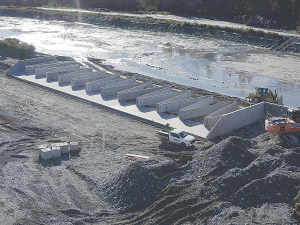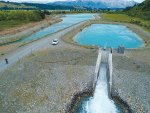Former dryland now irrigated under the Central Plains Water Ltd (CPWL) irrigation system is producing 475 million litres of milk a year, but would produce only 34 million litres in a dry year without irrigation, according to new figures released by the company.
The figures say the land also produces a 2 million kg of beef and 12 million loaves of bread, compared with only 0.86 million kg of beef and 9.4 million loaves without irrigation.
The numbers come from a study by The AgriBusiness Group Ltd and commissioned by CPWL for the company's 2024 annual report, which has recently been distributed to shareholders.
The report says CPWL's water supply has transformed central Canterbury's agricultural landscape.
"The 23,564 hectares that was dryland and dependent on rain, is now irrigated via the CPWL scheme. Production from this now irrigated land is significant and contributes to meeting the needs of a growing population and boosting the region's economy."
CPWL CEO Susan Goodfellow said it was time that there was greater awareness and acknowledgement of the positive economic impact that irrigation has on the region and some balance to what has tended to be negative public sentiment towards irrigation.
"We quietly work away and add value but, but we often face criticism by those that do not fully understand what we do and the contribution we make," she said.
Read More
The benefits were evident across a variety of farm systems.
"Obviously we grow more than just milk, wheat for bread and beef. However, we selected these measures for the study because they can be related to by a wide range of households."
The study was based on last year's production figures, and assessed what production would have been without irrigation.
It considered only the 23,564ha of land in the CPWL area that was previously drylnd, not the 21,436ha now on the company system which was previously irrigated but relied on pumping groundwater from the aquifers.
The company says converting that land to CPWL surface water has reduced the impact aquifers and improved energy efficiency while maintaining crop yields.
The scheme had brought about a 50-70% reduction in abstraction of groundwater, and a 29% reduction in nitrogen discharged below the root zone on CPWL shareholders' farms. 100% of shareholders' farms have Farm Environment Plans and 99.3% have achieved grades of A or B in independent audits.
New Weir
Central Plains Water Limited has upgraded its water intake on the Rakaia River with a $1.7 million new "labyrinth weir" to increase the scheme's resilience to river floods.
Previously the intake had a straight concrete channel weir which in times of flood allowed excess water to overflow its top edge and return to the river, while in more extreme floods a “fuse plug” - a sacrificial gravel bank - would blow out when river flows reached about 1200 cumecs. That would allow all the water to escape the weir, to protect the scheme’s intake gates and other infrastructure. However, resuming operations required a few days for the flood to recede and the plug to be reinstated, which has historically led to some extended disruptions to water delivery.
“We were quite vulnerable because every year we would usually get 1000-1200 cumecs three or four times a season, and we’d be anxiously watching the water lapping at the fuse plug and expecting it to go any minute. Sometimes it would, and other times we would be lucky enough and it would hold,” said CEO Susan Goodfellow.
The new weir consists of a concrete labyrinth structure in a zig zag profile for a much greater effective length of about 250m. There is still a fuse plug but it is not expected to blow until a flood reaches around 3000 cumecs.



















